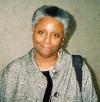Issue Date: July 18, 2003
The Catholic Theological Society of America held its annual
conference June 5-8 in Cincinnati. M. Shawn Copeland, president-elect and now
president of the society, chose the conference theme: “The Vocation of the
Theologian.” During the conference, reporter Margot Patterson
interviewed Copeland, a professor of theology at Marquette University who
will begin teaching at Boston College this fall, about some of the issues in
theology today and about Copeland’s own identity and experiences as a
theologian. NCR: The theme of this conference is “The Vocation of the
Theologian.” Would you say a little bit about how you see the vocation of
the theologian and the challenges to that vocation posed by the contemporary
world? I know that you are the first black woman to head the CTSA. How does
your identity as a black woman shape your concerns as a theologian? What it means to be a human being is extraordinarily important in our society, and I think African-Americans struggle with this question on a daily basis. Maybe in very egregious and painful ways, but also in ordinary, daily ways in which people are undercut at very good jobs; people are undercut in very prosperous circumstances. Ellis Cose wrote a book many years ago, called The Rage of a Privileged Class, in which he tried to explain how despite affirmative action and despite the progress or seeming progress of African-Americans, he had a number of descriptions of very affluent, well-trained, well-placed black attorneys trying to enter their offices and being stopped by white junior colleagues because they didn’t seem to belong. What characterized the lack of belonging was simply their race. Do you have any idea why the church wasn’t more successful in
reaching Americans with its antiwar message? I imagine Catholic Americans were
supporting the war in about the same percentage as non-Catholics, despite the
church’s mounting a spirited critique of it. I also think the vast majority of Americans right now are very afraid. September 11th really was a very difficult thing for us. We don’t know what it’s like to have that kind of experience. We’ve never had that kind of experience in this country. I think that perhaps people felt afraid; they felt their way of life, our way of life was threatened, and I think they felt the only response was a strong one. I think the ability to sustain a democracy depends upon critical conversation. It depends upon serious people who are willing to talk, who are willing to educate themselves about the issues. And I think the more in which we fail to engage our citizenry in this way, the more in which people move away from participation at local levels, it trickles up to state levels, it trickles up really to national levels. And so there’s a certain fear. Many Americans thought that people were attacking our way of life, that they were jealous and vengeful. Really, I think that people were trying to say to us that we don’t hate you, but we really are tired of your arrogance, your indifference. We’re tired of your dismissive attitude toward the rest of humanity. And this takes me back to theological anthropology, which is a very important issue. It’s the human other. We can’t seem to hold respectfully and reverently before us the face of the human other without trying to conquer, change, manipulate in some way. We just can’t seem to be patient and listening. Do you think that theologians have anything in particular to say about
the sex abuse crisis in the American Catholic church and why it occurred? And
does this crisis to some degree reflect any failure of theological
understanding? Recently, someone did an article in The New Yorker in which they accuse the bishops of using psychiatry as a kind of hideout for these problems. And I thought about that because I’ve been thinking that part of our problem has been a failure to sufficiently educate these men, not in the last 10 years, but I’m talking about the older abusers, people like [former priest John] Geoghan, people like [Fr. Paul] Shanley. There’s been a breakdown in their formation in terms of psychology and psychological development. That remains to be determined -- it’s merely on my part a hypothesis about the failure of psychological integration in formational experiences. But I think what’s also true is that it was unfair of this author to really accuse the bishops of simply using psychology as a hideout when in fact there probably was an effort on the part of many people to try to understand what was happening. This particular author suggested that some people ignored their warnings. It’s a very interesting piece, but I think theology is struggling both to answer questions about human sexuality in a complex way and to answer questions about human psychological and physiological development. And I think theology is trying to understand really the meaning of authority in the church. Margot Patterson is NCR opinion editor. Her e-mail address is mpatterson@natcath.org
National Catholic Reporter, July 18, 2003 |
